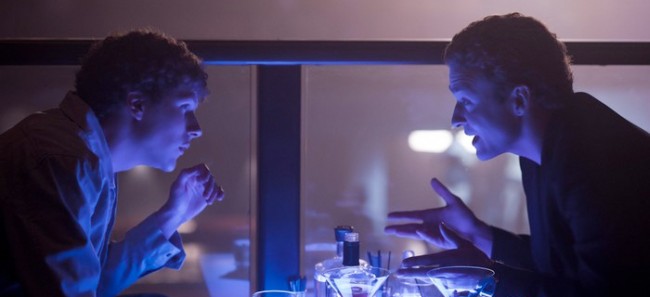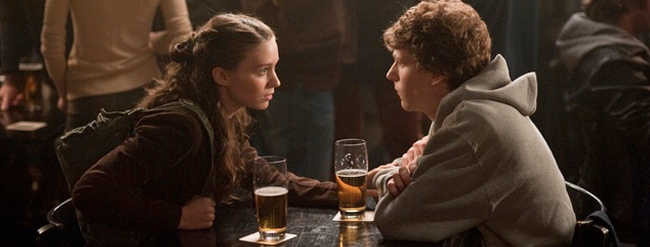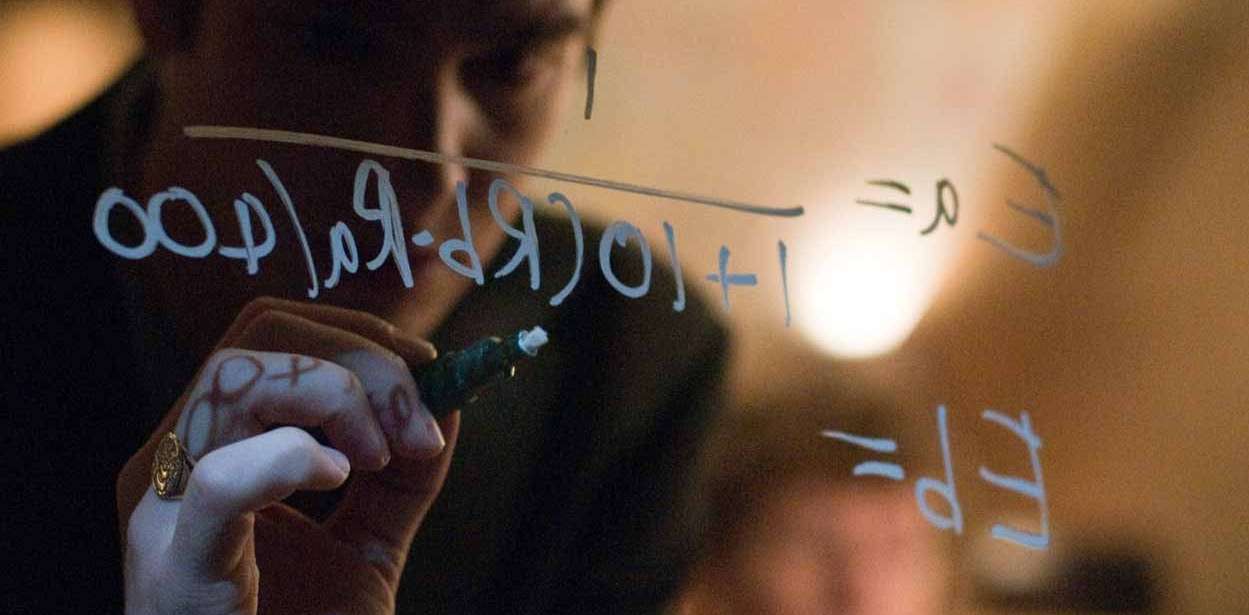
Film critics always dance with the danger of hyperbole. When your profession consists of seeing hundreds of films each year of wildly varying quality, you can’t throw out platitudes all willy-nilly. The edge of your adjectives belie the quality of any given film; shades of words give the right kind of praise that separates a good movie from a great one. For as much as they are hired to critique movies, they also serve as gatekeepers to the culture at large, defining which films are worth remembering.
The Social Network was lauded with many great reviews and wonderful phrases (“hyper-smart, superbly entertaining” “thrillingly intense” “a barn-burner of a tale“), but these are rather generic platitudes that can be slapped on any number of movie posters on a yearly basis. This film seemed to earn something grander than that, a title that refers both to the quality of the film and its subject matter. And what’s why The Social Network gets that once-every-decade crown, as it very importantly SPEAKS FOR A GENERATION!!!! Considering it was almost universally cited as a film that came from – and speaks to – the Generation X and Y-dominated zeitgeist, you would think there would be some consensus on just what it is that makes this movie so gosh darn important. But the reasons are as disparate as the founding of Facebook as depicted in the film itself.
Peter Travers’ review-cum-coronation uses a whole gaggle of Facebook-related jokes and puns to keep it topical (and to eventually date it) before eventually deciding that the film’s main theme is what speaks to kids these days: a lonely guy can connect with people through a computer but not in real life. David Edelstein posits that people, like Zuckerberg, are outsiders and can now eschew the WASPy, entitled groups with members like the film’s Winklevi and create their own social groups. Manohla Dargis pegs this film as the Maginot Line in a battle for the human soul against the cold and distant forces of the computer, while Ty Burr takes out his aggression on every anonymous internet commenter that ever swung by Boston.com by describing an entire generation’s communication online as, “the loneliest, most self-absorbed activity of all.” Yeesh.
For all of these ideas proposed, these people are as disconnected from this movement and generation as the filmic Zuckerberg (played by Jesse Eisenberg) is so famously pulled away from common society. The Social Network does encapsulate all of the above, but they gloss over the power and opportunity the Internet provides. Mark Zuckerberg is many things (as the film’s brilliant marketing campaign shows) but in the end he’s someone who realized the illicit meritocracy of the Internet and its ability to buck “climbing the ladder” entirely.

From children in pre-K through powerful CEOs who sit in their corner offices in Manhattan high-rises, it is known that there are steps we all must go through in order to succeed. At the beginning of the film, Mark is no different. He learned the alphabet in kindergarten, he did well on his standardized tests in elementary school, he achieved an impressive GPA and a perfect SAT score that landed him at Harvard University. He is currently in step 845 of 13,294 in order to get his goals, and is acutely aware of what steps lay ahead. If he gets in to a Final Club, his ceiling to success in this system gets bumped up to the point where he could end up in the White House. His then-girlfriend, Erica (the whimsical Rooney Mara), seems put-off by this sort of thinking, but it is the foundation for how one succeeds in this country. You make the right friend, know the right guy, talk to the right woman, put the right amount of work in at the right institutions and you are granted success.
Much has been made about Mark’s creation of FaceMash and how it helped create thefacebook, but few discuss how the success of that site (22,000 hits before crashing the Harvard internet system) led to his vision for the company. In that sequence, we see Mark drinking and hacking and blogging at a rapid pace, one matched by the voracious co-eds who keep logging in. While the morals, or lack thereof, involved in all of this is beyond questionable, the lesson learned is such: people want what they want, when they want it and they always want access to it.
When this activity crashes the system, we see the man who is put in place to look over it: stodgy, old, slow-moving, a man wandering in the dark for his glasses. This is the guy who put in his time, kissed the right amount of ass and landed an IT position at one of the most prestigious universities in the world. And a college sophomore just ran circles around him in the matter of hours. This idea is furthered when Mark is brought in to face the charges at the feet of the disciplinary board, a bunch of old fogies who probably learned what email was a year ago when their kids told them about it.
By the time Mark meets the Winklevoss twins (a mixture of Armie Hammer and Josh Pence) and Divya Narendra (Max Minghella), the game in his mind has already changed. The twins try to butter him up by showing exactly what this sort of position with these sorts of gents could land Mark. They bring him in to their secret club (but only in the bike room, obviously) to get him ever-so-closer to the Harvard life that everyone wants, that Mark once opined for. When Narendra is brought into the picture, they discuss how their previous coder went on to get a job at…Google. Yes, THE Google! The assumption being that somehow working for these guys for a few months landed him that posh computing job. But by this point, Mark barely has enough excitement to muster lifting his sandwich to his mouth.

This idea of new business versus old takes from in Mark’s eventual split with his CFO (and, pointedly, his only friend) Eduardo Severin (Andrew Garfield). Mark’s brilliance didn’t just lie in the idea of Facebook, but in his staunch belief that there shouldn’t be ads, it shouldn’t be sold and it should never crash, a bunch of business points that flew in the face of how business on the Internet was done (especially the “no ads” doctrine, which is now Facebook’s main revenue stream). This sort of renegade business model is embodied in the reckless form of Sean Parker, the former Napster co-head played by a cocky, arrogant and potentially dangerous Justin Timberlake. In between Parker’s devil-may-care attitude and Severin’s old-school, Harvard Business route of selling ad space and pressing flesh with New York ad executives who have no idea what thefacebook even is lies the answer, or the beginning of it at least. Eduardo probably would have been happy to sell this idea off to a large corporation, get their capital, watch them slowly edge them out and ruin the product because they don’t know what to do with it. Ask Tom how selling MySpace to News Corp. went.
At the heart of this film (whether or not it has a soul is up for debate) is a story about one boy fighting against the establishment, something David Fincher, the director of Zodiac, Se7en and most especially Fight Club, knows all too well. In the making-of documentary, How Did They Ever Make A Movie Of Facebook?, there is a look into the rehearsal process which essentially boils down to a clash and understanding of what the film is about between Fincher and its writer, Aaron Sorkin. They are discussing the scene where Sean Parker tells Mark that he should have a business card with “I’m CEO, Bitch” emblazoned on it, and why that would be so appealing to Mark. Sorkin mentions how that ties in to the failed relationship with Erica and how this is all some large ploy to show that her assessment of him is wrong. Fincher, however, takes a drastically different approach:
It doesn’t have to be the girl who [explicative] the lacrosse captain. “I’m CEO, Bitch,” is anybody who looks at a twenty-one-year-old who says, “I invented this great thing,” and they go, “isn’t that great! Of course we want you on our board and we want your ideas further and we want to have a relationship with you, but now you can go the [explicative] home because…we know what the [explicative] we’re doing with this thing and you’re finished.”
It’s not difficult to understand where Fincher is coming from based on past events in his career, starting with his debut feature-length film, Alien 3. His rocky relationship with the heads of 20th Century Fox and their involvement in the process of making that film has led him to leave it off his personal resume. This is from someone who got to where he did the right way, working his way through the ranks of ILM before getting a chance to direct music videos before finally cutting his teeth in feature work.
 He played the game, he followed the rules, and now he realizes that, if he was just a little bit younger, he could have skipped all of that. The tools are now available for anyone to become a filmmaker (as someone who shoots digital and edits movies on Final Cut Pro like he did with Zodiac must be acutely aware of). In the same way, the tools are available for anyone to create a website that turned into a phenomenon and morphed further into the default brand of interpersonal communication that has literally helped cause revolutions.
He played the game, he followed the rules, and now he realizes that, if he was just a little bit younger, he could have skipped all of that. The tools are now available for anyone to become a filmmaker (as someone who shoots digital and edits movies on Final Cut Pro like he did with Zodiac must be acutely aware of). In the same way, the tools are available for anyone to create a website that turned into a phenomenon and morphed further into the default brand of interpersonal communication that has literally helped cause revolutions.
People have always had the desire to strike out on their own, but they were never given the platform of pure meritocracy that the internet gives you. The cream always rises to the top, be it websites or viral videos or dopey photos of cats coupled with terrible spelling and grammar. What Zuckerberg, and this film, point out is that there is a prevailing change in the way things are done and how things will soon be done. Anyone can go out right now and shoot a full-length movie and put it on YouTube. Anyone can put out a terrible song and equally as terrible music video and make hundreds of thousands of dollars off of it.
When I look back on this movie in years time – this anarchic film whose Best Picture loss will only bolster its message and importance – I will regard it as a story of triumph, how one man with an idea decided to buck the common trend and do what he felt was right, regardless of how others perceived him or his business. He made friends, lost others, severed ties and moved forward, all with a singular vision that inevitably succeeded. This film will remind us of a time where the possibilities were limitless and the success could be unfathomable, if you just managed to play your cards right.
